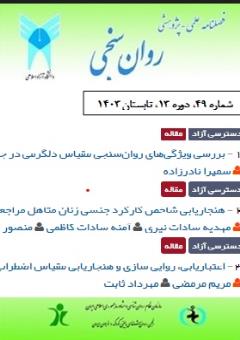بررسی ویژگیهای روانسنجی مقیاس دلگرمی در جامعه ایرانی
محورهای موضوعی : روان سنجی
1 - دانشگاه هرمزگان
کلید واژه: ویژگیهای روانسنجی, تحلیل عاملی, مقیاس دلگرمی, لذت, توانایی ادراکشده,
چکیده مقاله :
توانمندی شخصیت دلگرمکننده از دو جزء توانایی دلگرمی دادن و لذت بردن تشکیلشده است. به این معنا که افرادی که این توانمندی رادارند در دلگرمی دادن به دیگران خوب هستند و از انجام این کار لذت میبرند. این مقیاس به دلیل استقبال اخیر از نقاط قوت انسانی و اهمیت دلگرمی دادن در بسیاری از نقشهایی که روانشناسان مشاوره به عهدهدارند؛ مانند رواندرمانی، آموزش و نظارت، حائز اهمیت است. هدف از پژوهش حاضر بررسی ویژگیهای روانسنجی مقیاس دلگرمی در جامعه ایرانی بود. این پژوهش از نوع روانسنجی است و نمونه آماری آن شامل 319 نفر زن و مرد ساکن در استان هرمزگان است که با روش نمونهگیری در دسترس انتخاب شدند و مقیاس دلگرمی وانگ و شی (2019) و پرسشنامه همدلی دیویس (1983) را تکمیل کردند. نتایج تحلیل عامل اکتشافی دو عامل لذت و توانایی ادراکشده را نشان داد که 13/58 درصد از واریانس کل را تبیین میکردند. همچنین نتایج عامل تأییدی بهمنظور بررسی روایی سازه نشان داد که مدل دوعاملی مقیاس دلگرمی از برازندگی مطلوبی برخوردار است و کلیه شاخصهای برازندگی نشان دادندکه مدل اندازهگیری مقیاس دلگرمی در دامنه مطلوبی قرار داشتند. ضریب دو نیمهسازی برای همبستگی نیمه اول و دوم 60/0 به دست آمد. بررسی ویژگیهای روانسنجی، پایایی و روایی مناسب این پرسشنامه، کوتاه بودن و سهولت اجرا، شرایط استفاده وسیع محققان را از این ابزار فراهم میآورد و در جامعه ایرانی میتواند در موقعیتهای پژوهشی مورداستفاده قرار گیرد و زمینه پژوهشهای متعددی را در حوزه تربیتی و روانشناسی مشاوره فراهم آورد.
The ability of encouraging personality consists of two components: the ability to encourage and enjoy. This means that people who have this ability are good at encouraging others and enjoy doing this. This scale is due to the recent acceptance of human strengths and the importance of encouragement in many roles that counseling psychologists have; As with psychotherapy, training and supervision are important. The purpose of this research was to investigate the psychometric properties of the encouragement scale in Iranian society. This research is of the psychometric type and its statistical sample includes319 men and women living in Hormozgan province, who were selected by available sampling method and completed Wang and Shi's encouragement scale (2019) and Davis' empathy questionnaire (1983). The results of exploratory factor analysis showed two factors of pleasure and perceived ability, which explained 58.13% of the total variance. Also, the results of the confirmatory factor in order to check the validity of the construct showed that the two-factor model of the encouragement scale has a good fit and all the fit indices showed that the measurement model of the encouragement scale was in a good range. The coefficient of two halves for the correlation of the first and second halves was 0.60 Examining the appropriate reliability and validity psychometric features of this questionnaire, its shortness and ease of implementation provide conditions for the wide use of this tool by researchers, and it can be used in research situations in Iranian society.


